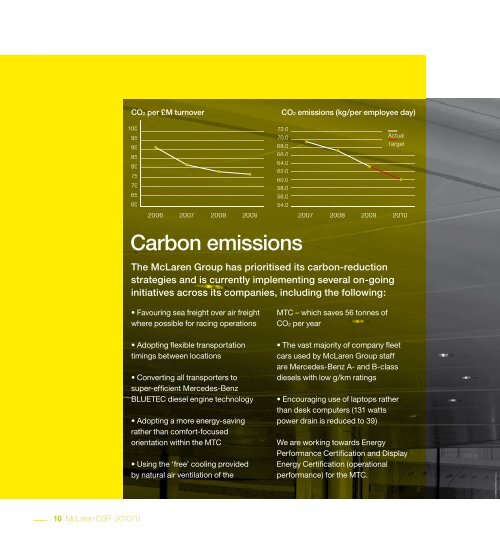Mclaren Group CSR
Mclaren Group CSR
Mclaren Group CSR
Create successful ePaper yourself
Turn your PDF publications into a flip-book with our unique Google optimized e-Paper software.
10 McLaren <strong>CSR</strong> 2010/11<br />
CO2 per £M turnover CO2 emissions (kg/per employee day)<br />
100<br />
95<br />
90<br />
85<br />
80<br />
75<br />
70<br />
65<br />
60<br />
2006 2007 2008 2009<br />
Carbon emissions<br />
The McLaren <strong>Group</strong> has prioritised its carbon-reduction<br />
strategies and is currently implementing several on-going<br />
initiatives across its companies, including the following:<br />
• Favouring sea freight over air freight<br />
where possible for racing operations<br />
• Adopting fl exible transportation<br />
timings between locations<br />
• Converting all transporters to<br />
super-effi cient Mercedes-Benz<br />
BLUETEC diesel engine technology<br />
• Adopting a more energy-saving<br />
rather than comfort-focused<br />
orientation within the MTC<br />
• Using the ‘free’ cooling provided<br />
by natural air ventilation of the<br />
72.0<br />
70.0<br />
68.0<br />
66.0<br />
64.0<br />
62.0<br />
60.0<br />
58.0<br />
56.0<br />
54.0<br />
MTC – which saves 56 tonnes of<br />
CO2 per year<br />
Actual<br />
Target<br />
2007 2008 2009 2010<br />
• The vast majority of company fl eet<br />
cars used by McLaren <strong>Group</strong> staff<br />
are Mercedes-Benz A- and B-class<br />
diesels with low g/km ratings<br />
• Encouraging use of laptops rather<br />
than desk computers (131 watts<br />
power drain is reduced to 39)<br />
We are working towards Energy<br />
Performance Certifi cation and Display<br />
Energy Certifi cation (operational<br />
performance) for the MTC.<br />
Waste management<br />
Last year, the McLaren <strong>Group</strong><br />
produced around 1,072 tonnes of<br />
general waste (excluding trackside<br />
and Absolute Taste operations) in<br />
two main categories: General<br />
(including packaging and textiles)<br />
and Hazardous (paint waste to<br />
epoxy-based products). Disposing<br />
of this has an impact on the<br />
environment, so best-practice<br />
waste management is a priority.<br />
After a review identifi ed that under<br />
one-fi fth of the 783,405kg of general<br />
waste generated was being recycled,<br />
the McLaren <strong>Group</strong> committed to<br />
a fully integrated waste management<br />
plan from 2005, including: changing<br />
business practices; segregation of<br />
waste at source; and ensuring<br />
adequate waste storage facilities<br />
The long-term objective is zero<br />
waste to landfi ll.<br />
In its fi rst year, the programme<br />
achieved a 100 per cent recycling<br />
target of the 65,500kg of waste wood<br />
generated by the <strong>Group</strong>. This was<br />
chipped and delivered to Slough<br />
Heat and Power, where it is used<br />
as part of Biomass fuel.<br />
By 2009, the McLaren <strong>Group</strong><br />
generated 792,735kg of waste,<br />
and recycled 100 per cent of its<br />
general waste streams (wood, paper,<br />
cardboard and metal), accounting for<br />
over 60% of the total general waste.<br />
The <strong>Group</strong> also generated 343,400<br />
litres of hazardous waste in 49<br />
Percentage of waste recycled<br />
%<br />
70<br />
60<br />
50<br />
40<br />
30<br />
20<br />
10<br />
0<br />
2007 2008 2009<br />
By encouraging use of laptops<br />
instead of desk computers,<br />
we save around 30mWh – or<br />
60 tonnes of CO2 – every year<br />
different hazardous waste streams.<br />
Of those streams, 34 are now recycled<br />
100 per cent via processes including<br />
solvent, thinner and oil recovery;<br />
compaction, gas liquid separation and<br />
pyrolisis. Seven streams are recycled<br />
up to 96 per cent and the remaining<br />
eight are 100 per cent disposed via<br />
chemical and bacterial treatment.<br />
In 2010, our focus is upon textile and<br />
carbon fi bre streams, both of which<br />
present their own challenges. For the<br />
recycling of textiles, including team<br />
clothing, the main issue is one of brand<br />
protection. For carbon fi bre recycling<br />
to be improved, this will require further<br />
changes to our manufacturing process<br />
and on-site preparation.<br />
Of the 1,072 tonnes of waste<br />
generated by the McLaren <strong>Group</strong> last<br />
year, just 168 tonnes (15.5 per cent)<br />
went to landfi ll. If successfully<br />
implemented, these new processes<br />
will remove a further 100 tonnes of<br />
waste from landfi ll to recycling.<br />
McLaren <strong>CSR</strong> 2010/11 11


